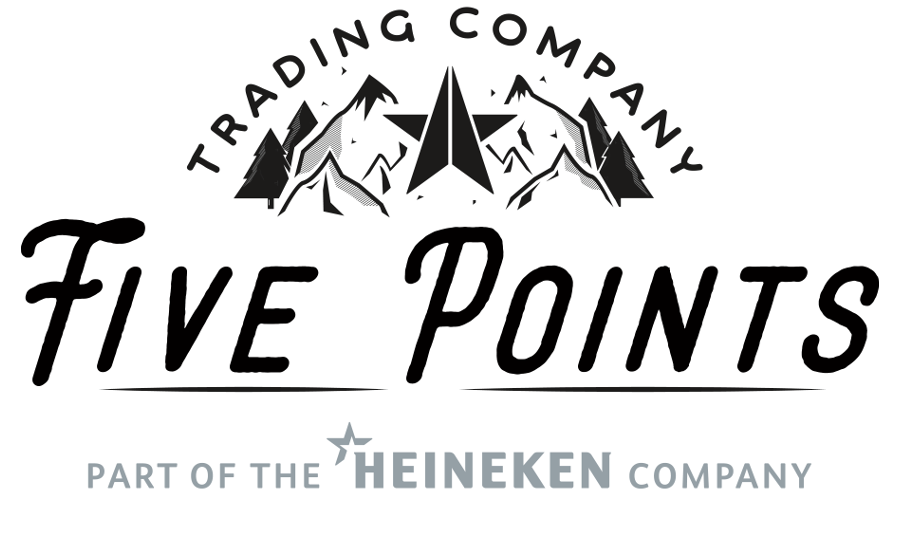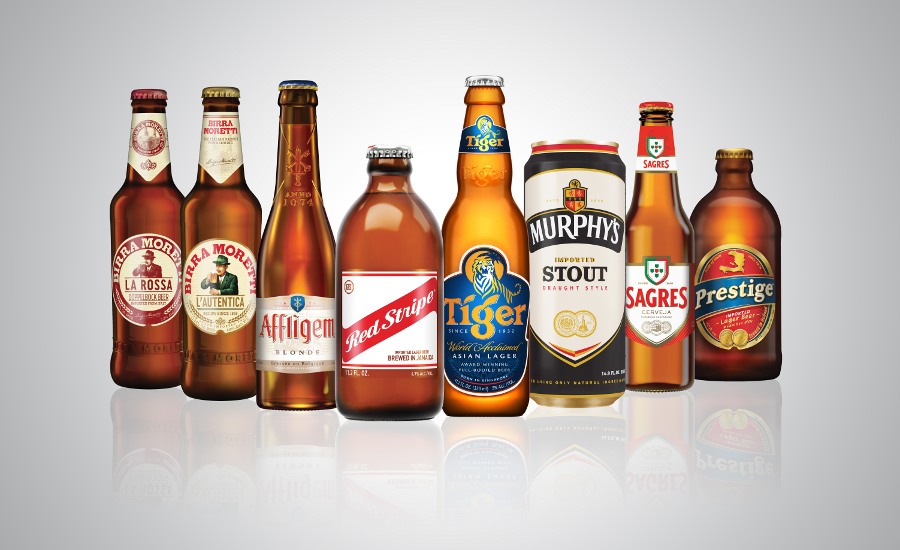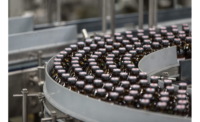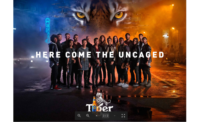Five Points Trading blossoms under HEINEKEN USA leadership
Venture incubates global beer brands for U.S. market




As consumer preferences have evolved, premium and super-premium markets have been among the beneficiaries of this trend. In the U.S. beer market, craft beer and imported beer exemplify this trend as case sales continue to outperform the overall beer market. According to Chicago-based Information Resources Inc., craft beer case sales were up more than 3 percent and imported beer sales were up more than 7 percent for the 52 weeks ending May 14 in U.S. multi-outlets.
With consumers desiring more premium options, White Plains, N.Y.-based HEINEKEN USA took its expertise as a global brewer of major brands, including Heineken and Dos Equis, to embark on a journey to give consumers the premium beer tastes from the diverse sources that they desire.
In fall 2016, the company announced the formation of Five Points Trading Co., a new venture aimed at incubating a range of popular global beers in the United States. The new division officially began operations Jan. 1. Red Stripe, Tiger, Birra Moretti, Affligem, Murphy’s Stout, Prestige and Sagres are the brands supported by the new venture.
“The genesis was the commercial and financial opportunity presented by the new venture, but beyond that, Heineken, as the most international brewer, wanted to find a way to introduce more of our global high-end brands in the U.S., offering new profit opportunity for our trade partners and variety of the highest quality to consumers,” says Charles Littlefield, general manager of Five Points.
Littlefield adds that although Heineken is a leader in managing and growing big brands, Five Points is an opportunity to utilize that expertise to help smaller brands blossom in the U.S. market.
“Five Points is providing a big, global brewer with the experience in learning how to manage and build smaller volume brands,” he says. “We are learning and nurturing a different type of relationship with our distributors and adapting to different brand dynamics in the marketplace. Consumers are curious about the brands and curious about their provenance and taste profiles. It’s a slow build, but there’s an upward trend. We are encouraged by the trade and consumer interest, demand and acceptance.”
An endeavor like this is not without its obstacles, but Five Points is exemplifying much promise as the company continues to invest in its future.
“Of course, there have been transition challenges, but the path is clearer logistically as we now have eight shared demand centers with our other Heineken brands in the U.S. to facilitate order processing and fulfill supply commitments,” Littlefield says. “We are making a significant investment in infrastructure and people to work with our partners every day, as well as in brand marketing. We are focused, we are committed, and we are in this for the long term.”
Getting to know the brands
With seven diverse brands and heritages, Five Points has been busy educating partners and consumers about the historical and modern significance of each portfolio. The company also has made operational changes for some brands.
Among the most notable was returning production of Red Stripe to Jamaica after a four-year hiatus, Littlefield says.
“The transition went well and was well-received by the brewers and farmers in Jamaica,” Littlefield says. “Not unexpectedly, there have been supply chain issues from higher demand in Jamaica, as well as in the U.S. But we’ve added over 300 jobs at the brewery and on the farms in a boost to the local economy. As we resolve the issues and ramp up production, we are committed to sustainability, with a combined heat and power plant, improved energy efficiency, and a recycling process that returns water and waste back to the farmers for fertilizer. A new supply line has been added specifically for export demand, and we expect to see the benefit by Q4 of this year.”
Before its return to Jamaica, Red Stripe was being produced in Pennsylvania. The return to its native home has brought authenticity back to the brand, he explains.
“While many did not realize that Red Stripe was being brewed in Pennsylvania, the truth is we have tapped into tremendous ‘home equity’ by the return to Jamaica,” Littlefield says. “The brand’s authenticity is strengthened, and there is an improved perception of the liquid. With this, we aim to turn Red Stripe into a general market brand by optimizing production capacity and growing consumer demand in the U.S. and elsewhere.”
That demand also corresponds with the areas in which residents are most likely to visit in Jamaica. In fact, Littlefield says that the Top 10 markets for Red Stripe correspond with the markets that are the top Caribbean destinations for visitors.
“We invest in these markets with local plans that drive awareness and demand by tapping into authentic Jamaican experiences, culture, travel, and all the good times and passion points associated with its place of origin,” he says. “Red Stripe is the only real Jamaican beer, and the only beer brand with a rightful claim to an entire genre of music: reggae. We partner with the Jamaican Tourist Board, sponsor concerts and conduct bar promotions. Recently, we hosted consumers at the Red Stripe Reggae Sumfest in Montego Bay, Jamaica, at the ‘Greatest Reggae Show on Earth.’”
Another brand that possesses significant consumer equity is Tiger, which is an Asian beer sold in more than 50 countries.
“Born in tropical Singapore in Southeast Asia, it represents an Asia on the verge of breaking through, where bold and striking changes are occurring,” Littlefield explains. “We want to introduce this richness and culture to the U.S. Tiger is an urban brand, a young brand that targets 22- to 35-year-old male beer drinkers. Fifteen percent of the U.S. population growth by 2020 will come from Asian Americans, with 20 million centered in key markets — large urban centers like L.A., [New York], San Jose and Seattle. This represents a tremendous growth opportunity for a brand that is relatively new to the U.S. market.”
The Asian brew also has been active in conservation and give-back efforts. This spring, Tiger announced a six-year global partnership with the World Wildlife Fund (WWF), beginning with a $1 million donation to support the WWF’s tiger conservation efforts.
“Through our partnership with the World Wildlife Fund, we hope to see the wild tiger population double by 2022, helped by Tiger’s $1 million donation to the cause,” Littlefield says. “Through our promotions, we will match consumer donations while bringing awareness and understanding to global issues and empowering people for global solutions.”
Much more is in store for Tiger in the U.S. market. “We believe in challenging conventions and expectations,” Littlefield adds. “Whether it’s inventing our unique ‘tropical lagering’ process — Brewed by the Sun — or supporting environmental and wildlife issues, Tiger Beer champions ideas into action.”
Also with a rich history, Affligem, a blonde ale-style Belgian brew that is nearly 1,000 years old, which makes it the third oldest beer worldwide, Littlefield says.
“We pride ourselves that every drop of Affligem is crafted at the historical Abbey in Belgium with a recipe passed down through generations of monks, and with a style that has influenced American craft,” he says. “The Benedictine monks are still actively involved in the recipe, packaging and even marketing decisions to this day. Affligem is HEINEKEN USA’s most premium Heineken beer.”
That top premium positioning stems from the brand’s multi-sensorial experience. “Stimulating all five senses yields a beautiful beer with incredible aromas; [a] fresh, rounded taste; a bright, golden color; and iconic glassware,” Littlefield says. “Our primary promotional focus is on draft and serves to communicate what is most special about this beer.”
Although not 1,000 years old, Birra Moretti’s history dates back to 1859 when it was created in Italy. Among the qualities that resonate with consumers are simple, high-quality ingredients, Littlefield says.
“Brewed the traditional Italian way, Moretti understands the genuine pleasure of pairing a great beer with great food in great company,” he says. “Italian credentials, pleasure in ingredients and food, and authentic Italian cuisine and culture differentiate Birra Moretti from its competitors.”
The company also is showcasing how the Italian beer acts as a complement to life’s simple pleasures. “Birra Moretti brings Italian authenticity to what matters in life: friends, family and food,” Littlefield says. “As the ‘Official Unofficial Beer of Bocce,’ consumers enjoy two Italian classics: a Moretti and bocce ball. We are also active in timeless traditions like festivals and feasts. A Moretti moment celebrates community and time together.”
As the company notes, Five Points serves as a venture to help bring global, diverse beer tastes to the United States. With Murphy’s Stout, the company is doing just that.
“Murphy’s Stout taps into the ongoing market need for global taste discovery,” Littlefield says. “Brewed extra smooth with only natural ingredients, Murphy’s offers the richness of a dry stout without the hoppy bitterness. This dark beer is a rare find, surprisingly sessionable, with a 4.0 [alcohol by volume] and lager-equivalent calories. Murphy’s is not another IPA; its unique taste plays into choice, and a more authentic one.”
Another brand that Five Points has big plans for is Prestige, which traces its origins back to Haiti. Although the American-style lager currently is brewed in Holland because of infrastructure and supply issues, the company hopes to bring it back to the island of Hispaniola.
“We intend to return production to Haiti when conditions there improve,” Littlefield says. “With the recipe unchanged by the brewery’s location, Prestige represents the ‘pride of place,’ and enables a ‘taste of home’ for Haitians in the U.S. We aim to do the same for Prestige as we’ve done for Red Stripe: return the brand to its roots, support the local economy and insure ongoing supply to meet demand.”
Citing data about young legal-drinking-age consumers’ desire to try new beers, Littlefield highlights that Five Points is looking forward to bringing more choice to adventurous beer consumers.
“The Five Points portfolio is all about giving consumers the opportunity to try something new of the highest quality or rediscover a taste of home,” he says. “We represent authentic brands and consumer choice.” BI
Looking for a reprint of this article?
From high-res PDFs to custom plaques, order your copy today!








